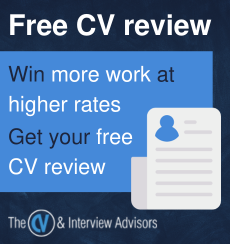How to use sales techniques to ace contractor interviews
When talking to contractors, I notice there’s often an awkwardness about calling client meetings ‘interviews’, writes Matt Craven, founder of The CV & Interview Advisors, which on Wednesday will run a free webinar to help you maximise your rate and win more work.
Is it an interview in the traditional sense or is it a sales meeting?! Regardless of how the world ought to be, client meetings with contractors still often resemble a job-seeker interview.
This article aims to bridge the terminology divide and turn an interview into a more contractor-appropriate meeting, by revealing how to use traditional sales techniques in the interview room.
Why you need the wedge, and where it comes from
Many years ago, I attended a sales training programme which focused on some of the fundamentals of selling. The trainer talked through the typical sales cycle, which they referred to as ‘The Sales Wedge’. They went on to draw a right angle triangle and divided it into five sections. At the thin end of the wedge was ‘Rapport Building’ (the start of the sales process), then there was ‘Needs Analysis’ (the largest section), then they had ‘Presentation’ followed by ‘Objection Handling’ and finally, ‘Closing’.
It made perfect sense and many years later, I have adapted the framework and strongly suggest using The Sales Wedge as a powerful technique to turbo charge your client meetings / interviews and drive more contract offers.
In real terms, regardless of one’s status as a contractor or job-seeker, an interview is no different to a sales meeting. In fact, it is identical in every way, apart from the fact that YOU are the product / service.
Look at it this way (and excuse my mathematical abilities), when everything is added up, a £500 per day contractor on a 12-month contract will cost a company around £150k once all costs are accounted for. That’s a big investment and in return, they will want you to demonstrate that you can give them a decent ‘Return on Investment.’
So how does The Sales Wedge work in a contractor interview scenario?
1. Building Rapport
Let’s start with Rapport Building. Strangely, many folks attend interviews with a rather sombre and serious demeanour -- it’s possibly the only situation where people adopt the same stiffness and demeanour as they would for a funeral. Sorry but this is NOT the way to impress a potential client! Instead, treat it as a traditional sales call, so:
- Smile;
- Be engaging;
- Make small talk / show some interest in the person you are meeting;
- Casually draw on research you did pre-call on LinkedIn / segue into some intel that you’ve discovered about the client; and
- Before proceeding, ensure you’ve struck up a half-decent conversation.
Your goal is to make them like you -- and make them feel positive about the fact that at some stage in the near future, they may be spending 8 hours a day and 5 days a week in close proximity to you!
2. Finding the Need
A Sales person would then move on to the Needs Analysis phase (asking questions) to find out their prospect’s need. There’s a saying that “Selling is not Telling” which rings very true. Basically, you can’t sell a solution or a product to someone unless you know what their exact needs / requirements are.
Let’s work on the principle that the basics of selling are to discover the client’s need and present a solution that satisfies this need. Let’s also work on the assumption that most interviews bypass this basic principle and become a bland Q&A session that benefits neither party!
So how are we going to do this ‘needs analysis’? Well, the key is to discover the client’s need by asking intelligent but open questions.
Knowing when to ask these questions relies a little (or a lot) on your own emotional intelligence and social aptitude. But if you can interject at the APPROPRIATE points and ask intelligent questions throughout the interview (rather than just at the end), you will hopefully glean some useful information. Or more than potentially – you may even strike gold and find some burning need that you are able to satisfy.
The client’s questions will prompt your answers, but perhaps there’s also a question that you can ask in return, based on what you extract from carefully listening to those questions. For example:
They say: “The company faces some significant challenges this year. How well do you cope working in an environment where things might not be running as smoothly as you might want?”
You give your answer but then ask them the following:
“So, do you mind me asking what these challenges are?”
3. Time to Sell
You then have the opportunity to PRESENT how you can help the client overcome these challenges. This might happen immediately after asking the question or when asked “why are you a suitable person for this opportunity/ project/brief?” later on in the meeting. You can then respond by reiterating what you have already been told.
For example:
“You have told me that the company will face significant challenges stemming from a lack of technical resource, including around skills involving ‘[A*&^%$]’ technologies
Then present your solution i.e. the Presentation phase.
“So, you may be interested to know that I have a deep network of contacts in the ‘[A*&^%$]’ technology field that I can rapidly engage to work on your project.”
See how that works? You are now a solution to their needs rather than someone simply looking for a gig!
So, to recap and continue, once you have built some rapport, done your needs analysis, and presented why you are the best person for the contract, are you then going to just get up and walk out of the room? Or are you going to court and handle the client’s objections? The answer is once again the obvious one!
4. Swat Away Objections
Now, courting and handling objections in an interview might seem odd, but here’s how you do it.
The trick is to wait until they ask you “Do you have any questions for us?” (which nearly always happens), and to then give this response (or something similar):
“Yes, I have very much enjoyed today’s meeting and really like the sound of the contract. For that reason, I would like to know if you have any reservations about me and my suitability?”
NOTE: To be consistent with your independent contractor status, and therefore compliant with IR35 rules in relation to ‘Substitution’ requirements, you should be referring to your COMPANY rather than YOURSELF as an individual. So to rephrase: ‘Do you have any reservations about my company and our suitability for the contract? We know that, in reality clients don’t always view contractors in this way, but it’s best to start as you mean to go on.
At this stage, you now would apply the Silent Close (basically shut up and wait for their response). And if they do have any reservations (about you / your company), hopefully they will tell you there and then, so you have the opportunity to swat away any negative thoughts that they might have about your capabilities or suitability.
5. You Catch More Flies with Honey
Last, but definitely not least, closing the sale doesn’t quite work in an interview, but my final piece of advice is to SOUND INTERESTED. You will be surprised how many people miss out on a contract offer because they played it too cool and the client assumed that they were disinterested or just not fussed. A better tactic is to thank the client for their time and try to leave them with the feeling that you are genuinely interested in their company and contract.
Remember, people like people who like them! This is a vital thing to remember when ‘closing’ both the interview and the competition out of getting their hands on your next opportunity!
Want more practical tips like this? This Wednesday, August 21st , at 7.15pm, ContractorUK will be running a 60 minute winning-work webinar that my company will provide to you free of charge. We’ll be pinning down 10 strategies to help you maximise rates, win more work and stay off the bench during the not-too-distant Autumn. You can register here: https://cvandinterviewadvisors.co.uk/cuk21aug



